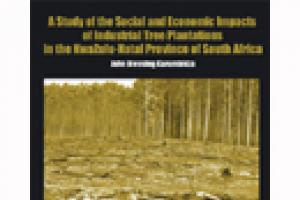Over the past two years I have made an uncomfortable discovery. Like most environmentalists, I have been as blind to the constraints affecting our energy supply as my opponents have been to climate change. I now realise that I have entertained a belief in magic.
Large-Scale Tree Plantations
Industrial tree plantations are large-scale, intensively managed, even-aged monocultures, involving vast areas of fertile land under the control of plantation companies. Management of plantations involves the use of huge amounts of water as well as agrochemicals—which harm humans, and plants and animals in the plantations and surrounding areas.
Bulletin articles
8 January 2006
Bulletin articles
8 January 2006
On November 2005, the International Labor Rights Fund (ILRF) filed an Alien Tort Claims Act case in US District Court in California against the rubber company Bridgestone alleging "forced labor, the modern equivalent of slavery" on the Firestone Plantation in Harbel, Liberia, of which Bridgestone is a partner.
Bulletin articles
8 January 2006
United Fiber System's plans to build a pulp empire in Kalimantan received a blow in January 2006, when Deutsche Bank confirmed that it has pulled out of its role as financial advisor to UFS. Five months ago, UFS announced that it had appointed Deutsche Bank's Singapore Branch as Financial Advisor on a proposed acquisition of the Kiani Kertas pulp mill in East Kalimantan.
Michael Hoelz, Deutsche Bank's managing director, confirmed in a statement to German NGOs that "Deutsche Bank no longer holds a mandate with UFS".
Bulletin articles
8 January 2006
Monoculture is the main tool used by the large trans-national capitals to appropriate and control land resources and cheap labour in the countries of the South, causing enormous impacts on biological and cultural diversity. Homogenization and the dramatic simplification of the agro-ecosystem enable them to maximize soil exploitation and labour through mechanized tasks that are easy to control and supervise. Sustainability is defined on the basis of codes of profitability and depending on the crop, cycles of ten, fifteen or twenty years are completed and then the land is abandoned.
Bulletin articles
8 January 2006
The struggle of the Tupinikim and Gaurani indigenous peoples is now facing an extremely difficult situation. In February 2005, following their decision to take back their lands occupied by the eucalyptus plantations of the Aracruz Celulosa pulp company, over 100 indigenous families returned to settle in the rural areas from where they had been evicted, thus opening up the door to hopes of a sustainable and decent future (see WRM bulletins 94, 96 and 101).
Bulletin articles
8 January 2006
At the end of December 2005, Ibama – Instituto Brasilero del Medio Ambiente y de los Recursos Naturales Renovables (the Brazilian Institute for the Environment and Renewable Natural Resources) - brought a lawsuit against the Veracel Celulose company. Using satellite imagery and geo-processing, it verified the pulp mill’s irregularities and fined it R$ 320.000 for preventing or hindering the natural regeneration of the Mata Atlântica forest over an area of 1,200 hectares and worsening the situation of this biome.
Bulletin articles
8 January 2006
The traditional January summer siesta in Uruguay has been interrupted, not only by constant rainfall but also because there has been no respite in the advance of the pulp mills. They continue with their advertising campaign, based on falsehoods, which are then repeated as truths. Promises and mirages made to a population with a high rate of unemployment, desperately in need of solutions.
Publications
25 December 2005
By John Blessing Karumbidza
Bulletin articles
9 December 2005
“The city of Vitoria in Brazil, owes its name to the “victory” of the colonialist Portuguese against the original indigenous inhabitants of the land. Today, the same name has a totally different meaning. The indigenous Tupinikim and Guarani peoples have retaken the lands that were stolen from them by the giant pulp mill corporation Aracruz Cellulose. They have been joined in the struggle against the company and its plants by other local communities and organizations from civil society who, through uniting in the struggle, have weakened the company’s power.
Bulletin articles
9 December 2005
The negative impacts of tree plantations on forests and forest peoples have been highlighted by WRM since its creation in 1986. The 1989 “Penang Declaration” which set out the shared vision of the WRM's members, identified tree plantations as “part of the policies and practices leading to deforestation throughout the world in the name of development”.
Other information
9 December 2005
Proponents of industrial tree plantations argue that plantations are "reforestation", increasing the area of forest, providing jobs for local people, or reducing pressure on natural forests. The reality in Cambodia exposes these arguments for propaganda.
Cambodia's Prime Minister, Hun Sen, has handed out vast areas of land concessions, many to his business acquaintances and friends. While Cambodia's 2001 Land Law limits the size of land concessions to 10,000 hectares, many of the concessions are far in excess of this area.
Bulletin articles
9 December 2005
From its beginnings in 1986, the World Rainforest Movement has been concerned about how forests, land and rural peoples’ lives are affected by industrial production of a whole range of commodities – soya, paper pulp, petroleum, timber, palm oil, maize, bananas, coffee and many more.
So it was only fitting that, in the mid-1990s, WRM began sounding alarms about another, brand-new export market that could also come to have severe effects on forests and the people who depend on them: the trade in biological carbon-cycling capacity.

